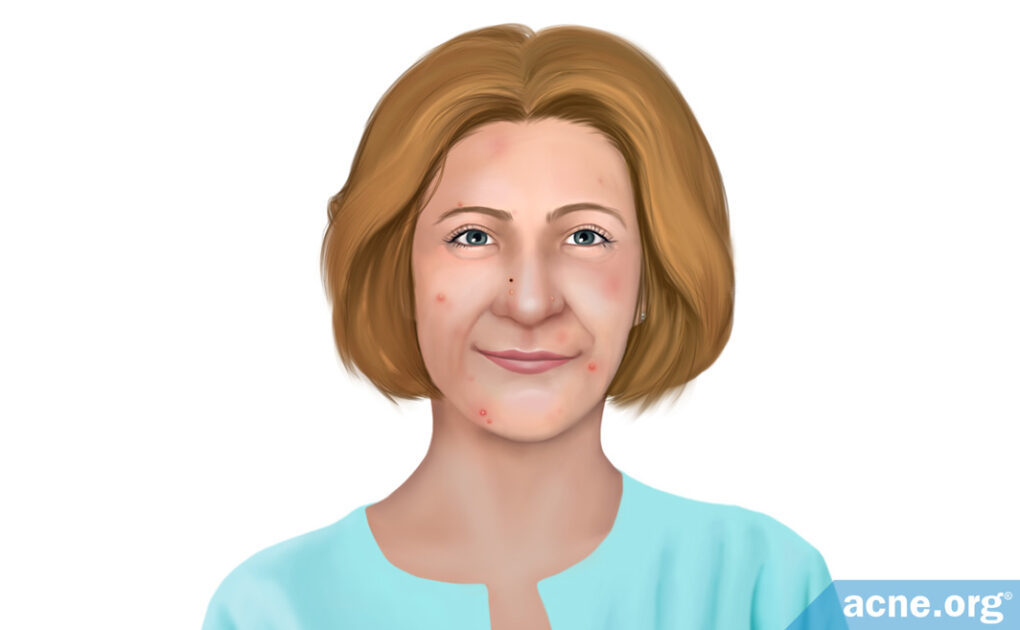Menopause-induced Acne is Uncommon but Can Occur

The Essential Info
Although uncommon, the hormonal changes that occur during menopause can result in acne. While acne typically decreases with age, fluctuating levels of hormones in the bloodstream during menopause may trigger acne and/or worsen existing acne. After menopause, however, acne is rare.
Special Note: If you are postmenopausal and experience new or worsening acne, be sure to see your doctor, since postmenopausal acne might be a symptom of another condition, such as a tumor or reaction to androgen (hormone) treatment.

The Science
While acne occurs most often in girls and young women, it can also afflict women who are going through menopause. This is because the skin is sensitive to hormones, and some of the hormonal changes that occur during the early stages of menopause may lead to acne in some instances.1-10
However, generally speaking, as women get older, acne decreases, and this trend occurs even through the menopausal years. In other words, while menopausal acne can occur, it is rare.
The following graph shows us how acne decreases with age. You will notice that it decreases even through the menopausal years.
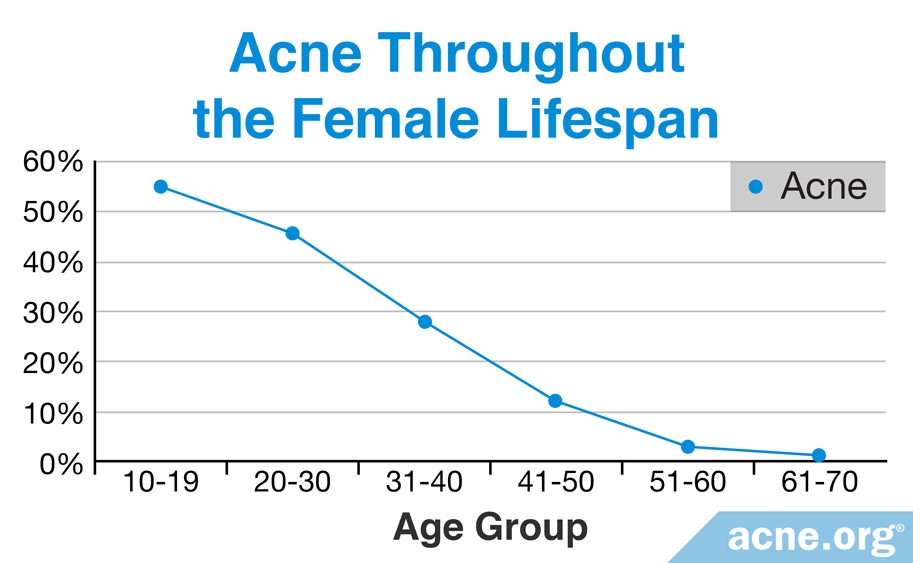
As you can see from the following chart, acne in women steadily decreases from adolescence through the years prior to menopause. After 40, it continues to decrease, even through the menopausal years.1
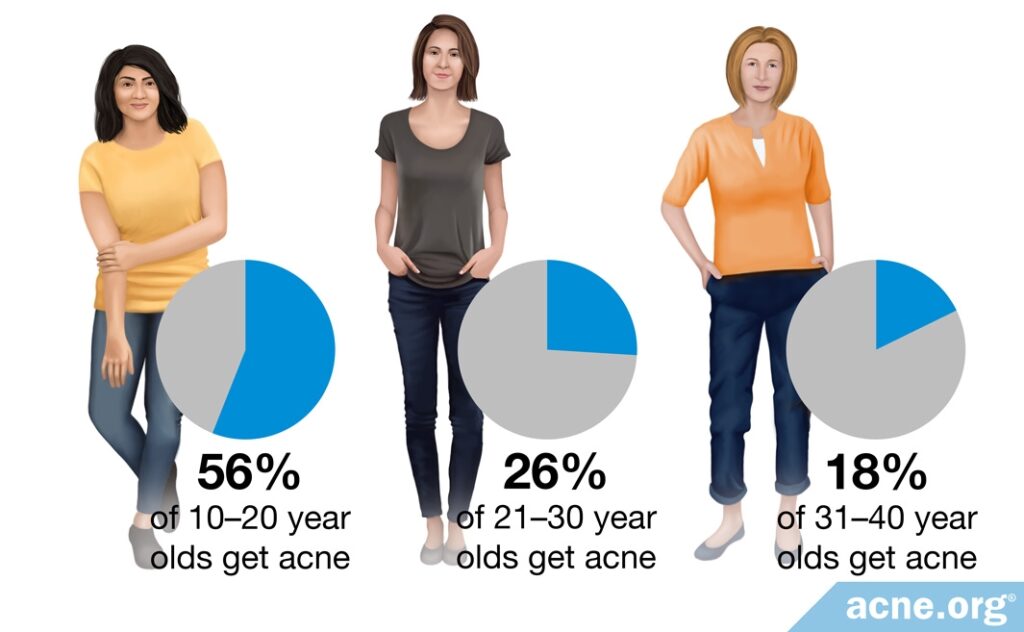
The Science: Acne During Menopause
The skin contains receptors for both estrogens and androgens (female and male hormones present in both sexes). Hormone receptors are found on skin cells, hair follicle cells, and skin oil gland cells. This ties in with acne because acne begins to develop from an overgrowth of skin cells inside hair follicles and usually is worsened by increased production of skin oil.
More specifically, during menopause, there is an increase in a hormone called follicle stimulating hormone (FSH). This hormone can stimulate the ovaries to produce more androgens (male hormones), which in turn can increase skin oil production. Though uncommon, this is how higher levels of androgens in the bloodstream during menopause would bring about acne.6
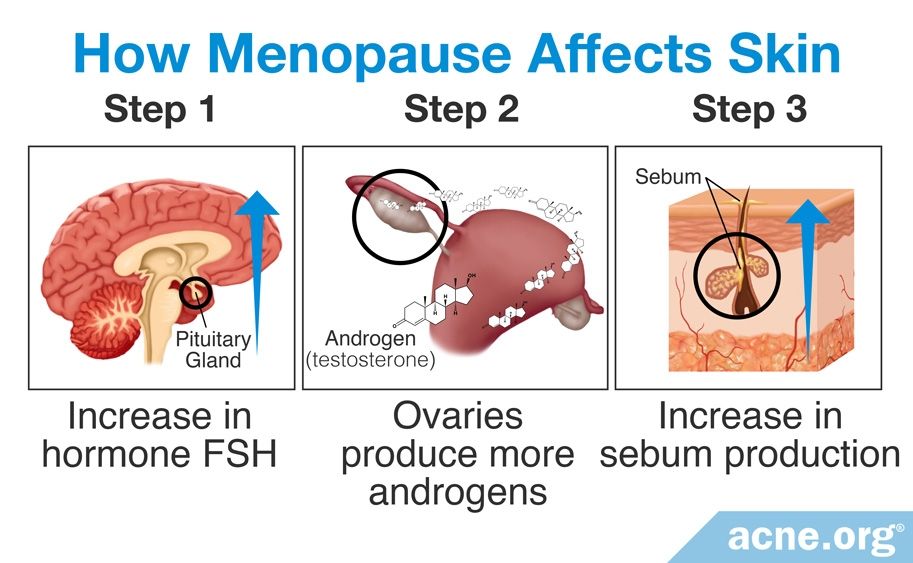
Features of Menopausal Acne
Acne during menopause is more likely to show up on the body, although it can also occur on the face. Menopausal acne tends to be less severe than adult acne, but like any other type of acne, it can cause emotional distress.11
Acne After Menopause Is Rare
As a rule, women do not experience acne after menopause. If acne does occur after menopause, you should visit a doctor because postmenopausal acne might be a symptom of another condition, such as a tumor.6
Post-menopausal acne may also simply be a reaction to medications that increase androgen levels in the bloodstream. Medical case reports and research articles describe a few examples of acne after menopause that is caused by medication. In one case study, an insomnia medication containing an androgen triggered acne in a postmenopausal woman.7 Other studies found that women who received hormonal treatment with testosterone (an androgen) after menopause were more likely to develop acne.9,10
Expand to read details of systematic reviews
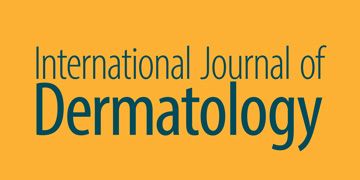
A 2009 case report in the International Journal of Dermatology described a 65-year-old postmenopausal woman who had acne lesions on her face and neck. The acne lesions were caused by an insomnia medication that contained both an androgen and an estrogen. Once she stopped taking the medication, the acne lesions decreased after several months.7
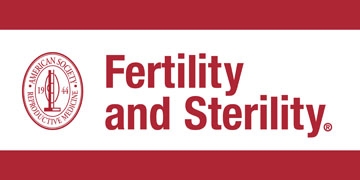
After menopause, some women receive treatment with testosterone (an androgen). A 2009 review in the journal, Fertility and Sterility, found that acne is a major side effect of testosterone treatment in postmenopausal women. The author concluded, “The major adverse reactions are the androgenic side effects of hirsutism [excessive hair growth] and acne.”9
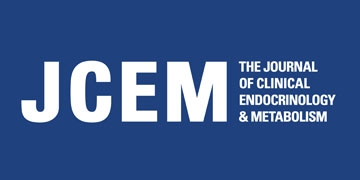
Similarly, a 2014 review in The Journal of Clinical Endocrinology and Metabolism, which included 35 randomized controlled trials, summarized the pros and cons of testosterone therapy in postmenopausal women. The authors found that combining such a treatment with hormone-replacement therapy increased the risk of developing acne. They concluded that in postmenopausal women, treatment with testosterone was “associated with…an increase in…the incidence of acne and hirsutism.”10
Treating Menopausal Acne
While acne that develops during menopause will likely go away on its own, many of the same treatments that work for acne in other age groups will also work to improve acne in menopausal women.
However, as skin ages, it becomes more sensitive (the skin barrier weakens), which means some standard acne treatments may be too harsh for menopausal women. In addition, as people get older, the risks of side effects of certain medications also increase.
Based on these considerations, a 2019 article in the International Journal of Women’s Health gave the following recommendations for treating menopausal acne:11
- Do:
[For patients] Try combination treatment consisting of benzoyl peroxide, topical retinoids (tretinoin, tazarotene, adapalene, trifarotene)12, and/or hydroxy acids
[For patients] Aim for a more active lifestyle, as reducing stress and maintaining a healthy weight can also help to control acne
[For doctors] If anti-androgen therapy (reducing the amount of male hormones) might help, consider prescribing spironolactone - Don’t:
[For doctors] Treat menopausal acne with antibiotics alone
[For doctors] Prescribe oral contraceptives to menopausal women as a way to control acne
The Takeaway
Women entering or in the midst of menopause should not expect to struggle with acne, but it can occur. If you do experience a slight flare of acne during menopause, don’t be alarmed. It should resolve on its own with time. However, if you experience acne after menopause, that may be the sign that you have an underlying medical condition or are experiencing side effects from medication. In those cases, talk to your doctor for a diagnosis.
References
- Perkins, A. C., Maglione, J., Hillebrand, G. G., Miyamoto, K. & Kimball, A. B. Acne vulgaris in women: prevalence across the life span. J. Womens Health (Larchmt) 21, 223 – 230 (2012). https://www.ncbi.nlm.nih.gov/pubmed/22171979
- Takahashi, T. A. & Johnson, K. M. Menopause. Med. Clin. North Am. 99, 521 – 534 (2015). https://www.ncbi.nlm.nih.gov/pubmed/25841598
- North American Menopause Society. The role of testosterone therapy in postmenopausal women: position statement of the North American Menopause Society. Menopause 12, 496 – 511 (2005). https://www.ncbi.nlm.nih.gov/pubmed/16145303
- Raine-Fenning, N. J., Brincat, M. P. & Muscat-Baron, Y. Skin aging and menopause: implications for treatment. Am. J. Clin. Dermatol. 4, 371 – 378 (2003). https://www.ncbi.nlm.nih.gov/pubmed/12762829
- Farage, M. A., Neill, S. & MacLean, A. B. Physiological changes associated with the menstrual cycle: a review. Obstet. Gynecol. Surv. 64, 58 – 72 (2009). https://www.ncbi.nlm.nih.gov/pubmed/19099613
- Vexiau, P. & Chivot, M. [Feminine acne: dermatologic disease or endocrine disease?]. Gynecol. Obstet. Fertil. 30, 11 – 21 (2002). https://www.ncbi.nlm.nih.gov/pubmed/11875860
- Chen, G. S., Lin, H. L. & Wu, C. Y. Iatrogenic androgen and estrogen excess in a postmenopausal woman presenting with facial erythema, acne, and hirsutism. Int. J. Dermatol. 48, 996 – 995 (2009). https://www.ncbi.nlm.nih.gov/pubmed/19702988
- Cheng, V., Doshi, K. B., Falcone, T. & Faiman, C. Hyperandrogenism in a postmenopausal woman: diagnostic and therapeutic challenges. Endocr. Pract. 17, e21 – 25 (2011). https://www.ncbi.nlm.nih.gov/pubmed/21247854
- Braunstein, G. D. Safety of testosterone treatment in postmenopausal women. Fertil. Steril. 88, 1 – 17 (2007). https://www.ncbi.nlm.nih.gov/pubmed/17493618
- Elraiyah, T. et al. Clinical review: the benefits and harms of systemic testosterone therapy in postmenopausal women with normal adrenal function: a systematic review and meta-analysis. J. Clin. Endocrinol. Metab. 99, 3543 – 3550 (2014). https://www.ncbi.nlm.nih.gov/pubmed/25279572
- Khunger, N., & Mehrotra, K. Menopausal acne – challenges and solutions. Int. J. Womens Health. 11, 555 – 567 (2019). https://www.ncbi.nlm.nih.gov/pmc/articles/PMC6825478/
- Sangha, A. M. Treatment of post-menopausal acne with tretinoin lotion 0.05% delivers rapid results and concomitant benefits. SAGE Open Med. Case Rep. 7, 1-4 (2020). https://pubmed.ncbi.nlm.nih.gov/32551118/
 Acne.org Products
Acne.org Products